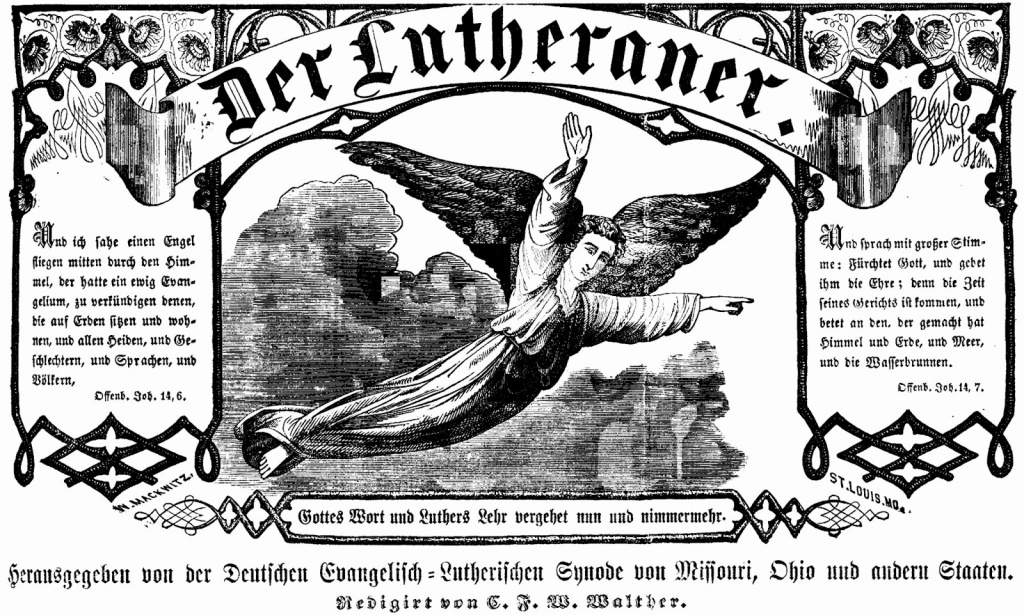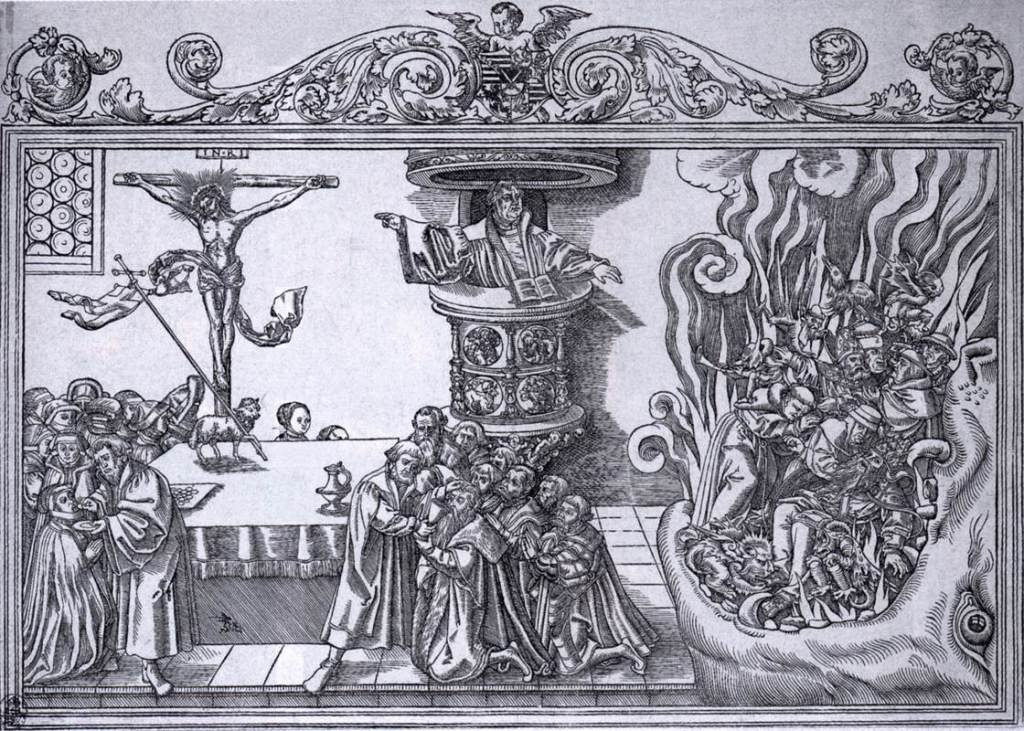A Jew in the LCMS going by the pseudonym “RedeemedUberYude,” who praises himself as the persecutor of Ryan Turnipseed, has made his curious relationship with Lutheranism quite apparent. First, he condemns Luther as sometimes “a sophomoric jerk,” “a racist,” and “an antinomian.” And not to condemn Luther for his “racism” is to “worship the monk’s sandals.” Thus this persecutor of the saints finds himself among Luther’s illiterate sons. And here one cannot help but be reminded of the accusations of Carl Stamm Meyer and others that C. F. W. Walther “was not wholly Christocentric but tended toward biblicism” (Concordia Theological Monthly, XLIII, p. 262),1 used “rationalistic argumentations” (Ibid., p. 267), “could be haughty, proud, and at times even inconsiderate” (Walther speaks to the Church, p. 10), verged on “Pietism” in his writings (Ibid., pp. 11, 90), approached “Donatism” in the same (Ibid., p. 62), and had “quaint exegesis” (Ibid., p. 65). But enough on that here. Let us return to the main topic.
Second, our plotter publicly holds a quatenus subscription to the Confessions of the Evangelical Lutheran Church. For he says, “We did not reject the papacy to replace the papacy, and the Lutheran Confessions are reliable INSOFAR AS they are faithful.” So our blasphemer considers the Confessions of roughly equal authority with the Koran of the Mohammedans. But perhaps he will assure us that, in his mind, the Confessions are a tertiary authority — right behind Scripture and his beloved Talmud! Such great alliances Pope Harrison has been cultivating!
But our Jew has a very good reason for rejecting the Confessions in part. If he were to say that the Confessions, in all their doctrinal content, simply repeat the teaching of Scripture, then he could not blasphemously assert that concupiscence — the inner desire to sin — is not actually sin. He even calls those heretics who say with the holy Lord that the desire to commit sin, is itself sin. So the following parts of the Confessions must be cast off and thrown to Satan, whom our opponent considers their source:
Also they teach that since the fall of Adam all men begotten in the natural way are born with sin, that is, without the fear of God, without trust in God, and with concupiscence; and that this disease, or vice of origin, is truly sin, even now condemning and bringing eternal death upon those not born again through Baptism and the Holy Ghost.
Augsburg Confession, Art. II
This passage testifies that we deny to those propagated according to carnal nature not only the acts, but also the power or gifts of producing fear and trust in God. For we say that those thus born have concupiscence, and cannot produce true fear and trust in God. …. when we mention concupiscence, we understand not only the acts or fruits, but the constant inclination of the nature [the evil inclination within, which does not cease as long as we are not born anew through the Spirit and faith]. …. Nor indeed is concupiscence only a corruption of the qualities of the body, but also, in the higher powers, a vicious turning to carnal things. Nor do those persons see what they say who ascribe to man at the same time concupiscence that is not entirely destroyed by the Holy Ghost, and love to God above all things. …. But they contend that concupiscence is a penalty, and not a sin [a burden and imposed penalty, and is not such a sin as is subject to death and condemnation]. Luther maintains that it is a sin. It has been said above that Augustine defines original sin as concupiscence. If there be anything disadvantageous in this opinion, let them quarrel with Augustine. …. These testimonies can be overthrown by no sophistry. [All devils, all men cannot overthrow them.] For they clearly call concupiscence sin, which, nevertheless, is not imputed to those who are in Christ, although by nature it is a matter worthy of death where it is not forgiven. Thus, beyond all controversy, the Fathers believe. For Augustine, in a long discussion, refutes the opinion of those who thought that concupiscence in man is not a fault, but an adiaphoron, as color of the body or ill health is said to be an adiaphoron [as to have a black or a white body is neither good nor evil]. …. The defects and the concupiscence are punishments and sins.
Apology of the Augsburg Confession, Art. II
These men imagine that the Law of God has been comprised in outward and civil righteousness; they do not see that it requires true love to God “with the whole heart,” etc., and condemns the entire concupiscence in the nature. Therefore no one does as much as the Law requires.
Apology, Art. XIIb
We are speaking not of concupiscence, which is sin…. And we are speaking, as it has been said above, not of concupiscence, which is sin…. Again, if purity is properly opposed to concupiscence, it signifies purity of heart, i.e., mortified concupiscence, because the Law does not prohibit marriage, but concupiscence, adultery, fornication.
Apology, Art. XXIII
It was impossible that they should teach correctly concerning repentance, since they did not [rightly] know the real sins [the real sin]. For, as has been shown above, they do not believe aright concerning original sin… It had to follow thence [from this dogma] that they did [must do] penance only for actual sins, such as wicked thoughts to which a person yields (for wicked emotion [concupiscence, vicious feelings, and inclinations], lust and improper dispositions [according to them] are not sins), and for wicked words and wicked deeds, which free will could readily have omitted.
Smalcald Articles, Part III, Art. III
Therefore, we reject and condemn the teaching … that evil lusts are not sin, but con-created, essential properties of the nature, or, as though the above-mentioned defect and damage were not truly sin, because of which man without Christ [not ingrafted into Christ] would be a child of wrath.
Formula of Concord, Epitome, Art. I
Now this doctrine must be so maintained and guarded that it may not deflect either to the Pelagian or the Manichean side. For this reason the contrary doctrine concerning this article, which is censured and rejected in our churches, should also be briefly stated. And first, in opposition to the old and the new Pelagians, the following false opinions and dogmas are censured and rejected, namely, … that sinful, evil lusts are not sins, but conditiones, or concreated and essential properties of the nature. Or as though the above-mentioned defect and evil were not properly and truly sin before God, on account of which man without Christ [unless he be grafted into Christ and be delivered through Him] must be a child of wrath and damnation, also in the dominion and beneath the power of Satan.
Formula, Solid Declaration, Art. I
But our enemy does gladly approve with heart and mouth the blasphemy of the Confutation: “Moreover, the declaration is also rejected whereby they call the fault of origin concupiscence, if they mean thereby that concupiscence is a sin that remains sin in a child even after baptism.” So one can easily see who his brothers in the faith he pretends to follow are.
While more could be said of the swine’s denial of the doctrines of Scripture, there is no need for the reader to undergo spiritual torture of that kind. Therefore, let this be the conclusion for the time being to this short table of errors.
1. See also Concordia Theological Monthly, XLIV, p. 163. It should also be noted that the modern LCMS also accuses Walther’s successor, Franz Pieper, of having a “tendency toward Fundamentalism” (Defending Luther’s Reformation, p. 155), which is rejected in the heterodox LCMS.





